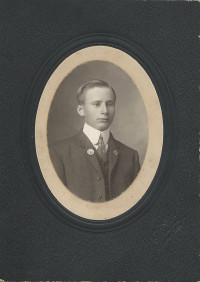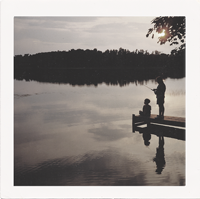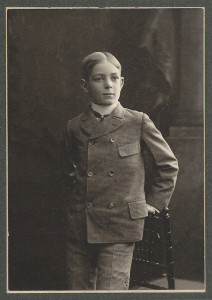A portrait of: Michael Pendergast (b.1892 Dowagiac, MI – d.1958 Joliet Federal Prison, Joliet, IL
Michael Pendergast was the eldest son of William Pendergast (b.1867 – d.1941) and Teresa Fagan (b.1871 – d.1918), granddaughter of Michael Fagan & Biddy Fagan.

Michael Pendergast college photo 1909 with mounting pin of grandfather John Fagan
Michael’s father, William Pendergast, was a beekeeper and inventor originally from Vermont, but who traveled west and settled in Dowagiac, Michigan, in 1883. With a little seed money he had saved, William partnered with a local inventor, entrepreneur, and fellow apiary, James Heddon. The two modest beekeepers soon became internationally famous for their many innovations connected to bee culture, and the success of their apiaries made them the leading honey producers in the country.
Heddon & Pendergast’s greatest invention, however, had nothing to do with bees, but with fishing. They are credited with, and hold the only patent for, the casting plug, a fishing lure still in use by anglers today. Heddon & Pendergast experimented and perfected their designs, and by the turn of the 20th century their unique lures appeared on fishing poles and in tackle boxes throughout the United States and Canada.
In 1911, riding on the coattails of his father’s financial success and notoriety, Michael Pendergast enrolled at the University of Michigan in Ann Arbor, where he was encouraged by his father to study law. But Michael, always a restless if not recalcitrant individual, rarely attended class and quit school during his second year of study. Much to his parents’ disapproval, Michael began a courtship with a local saloonkeeper’s daughter, Celia Boyle (b.1895 – d.1983) of Vandalia, Michigan. They were married on Friday, November 24th, 1916, at the County Seat Courthouse in Cassopolis.

Fishing down by the lake at Camp Farm Road
Having fallen from his father’s graces during his years of reckless behavior, and with few prospects, Michael took what menial work he could find – as a farmhand, mostly. With a small inheritance he received when his mother died in 1918, he and Celia purchased a 117-acre spread and built a fine frame house at the end of the lane on the edge of pristine Hutchen’s Lake where, as a boy, he had spent many happy hours with his father and brothers fishing and exploring the mossy woods with their towering stands of Black Walnut. From a young age, Michael possessed an uncommon affinity for the bucolic countryside that surrounded him and he enjoyed the serenity of the farm and the enveloping woods. In 1922 Celia gave birth to twin sons, Casey and Willie. But Michael had difficulty settling into the responsibilities of married life and the role of fatherhood. He became increasingly agitated and shiftless and would often disappear for days or even weeks at a time and return apologetic, but always with money in his pocket.

Michael Pendergast c.1901
In June 1926, Michael, using a false identity, was nabbed in a police raid and shoot-out in Benton Harbor. He was a smalltime rumrunner during prohibition but had inadvertently become entangled with the Chicago Outfit in an elaborate bootlegging operation originating in Canada. Cargo-holds full of whiskey and rum were shipped down Lake Michigan from Ontario and offloaded at ports in southwest Michigan, eventually destined for speakeasies in Chicago. Michael was hired to assist on one of these midnight runs, in exchange for a few cases of Canadian Whiskey. That night, the FBI was tipped off. The Chicago Outfit’s rival North Side gang also got wind of the shipment. The exchange was interrupted in a hail of gunfire in which two FBI agents were killed. Michael was arrested and framed by the Chicago mob for their murders. He was sentenced to life in prison by an unsympathetic teetotaling judge. Fearing retribution from Capone’s men, Michael Pendergast quietly accepted his punishment. To spare his wife and children the humiliation of his crime and fearing for their safety, Michael kept his true identity a secret, leaving all to believe he had taken the coward’s way out by abandoning his family. His remarkable story was not revealed until after his death in 1958 at the Federal Prison in Joliet, IL.
Read More
Rum-running on the Great Lakes
Rum-running on the Great Lakes 2

